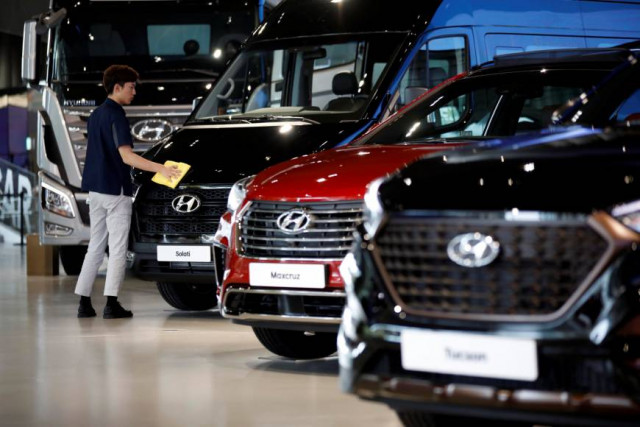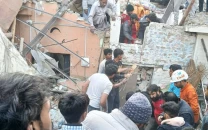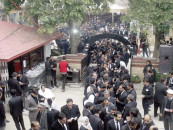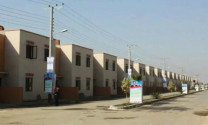Regulating vehicular emissions on the cards
Senate panel on climate change decides to table bill in this regard

A staffer polishes Hyundai vehicles at a showroom in Goyang, South Korea, last month. PHOTO: REUTERS
Chairing the committee meeting on Thursday, convener Senator Muhammad Asad Ali Khan Junejo said the idea was floated in the main standing committee to determine a limit of carbon emissions within the existing quality of automobiles and fuels available in the market.
"We cannot leave vehicles to spew heavy amounts of carbon at large as automobile manufacturers claim to have non-compliant fuel available which is the main cause of harmful emissions," he added.
Asad said he had prepared a tentative draft of the legislation which would be shared with the minister of state for climate change to have her ministry's input and experts' suggestion.
"Under the prevailing tense economic situation, we are proposing to regulate air pipe emissions of automobiles in the first phase. It is the global practice that vehicular emission testing also includes windpipe, tires, engine condition and the entire vehicles assessment. However, it is not possible for the public to take on another burden while bearing the brunt of inflation and increased financial load," he said.
The proposed legislation, he said would be tabled as a bill in the Senate where after approval would be sent to the National Assembly where the government's support would be required to get the legislation accepted.
"In the beginning, only air pipe emissions will be regulated where after three years the other aspects - motor inspection and testing - would be initiated. However, it will be approved as a whole and its implementation would be carried out phase-wise," Senator Junejo said.
The ministry, he said, would be authorised to review the standards in the legislation where an open-door policy had been adopted for detailed and inclusive consultations with all relevant stakeholders, including the Ministry of Climate Change (MoCC).
State Minister for Climate Change Zartaj Gul fully endorsed the idea to table the legislation on regulating vehicular emissions and directed the Environment Wing and Pakistan Environmental Protection Agency (Pak-EPA) director generals to make the lists of experts and relevant stakeholders for consultations to be made on the bill.
She suggested the convener of the sub-committee have a meeting at the MoCC to have detailed discussions with all relevant stakeholders, including the Ministry of Industries, the Petroleum Division and all others concerned.
She said it was very important legislation to control air pipe emissions and impose regular vehicle testing.
"In Muzaffargarh, around two years back 35 children died due to a CNG cylinder blast in a school van. There are also Ayub era's trucks plying on the roads that have gone redundant but still, such automobiles are in the system. Therefore, this legislation is pertinent in the prevailing scenario," she added. "All initiatives should be taken as a test case at the federal level with the provinces in the backdrop in such legislations. The bill should have special inclusion of provinces in this initiative."
The officials of the Ministry of Communications told the committee that the National Transport Centre's motor vehicle examiner lacked technological equipment to monitor air pipe emissions of vehicles.
"In Punjab, around 35 motor testing centres, including one in Rawat, have been established to conduct an inspection of vehicles. They have bought equipment from Sweden to hold the automobile examination," he added.
(With additional input from app)


















COMMENTS
Comments are moderated and generally will be posted if they are on-topic and not abusive.
For more information, please see our Comments FAQ